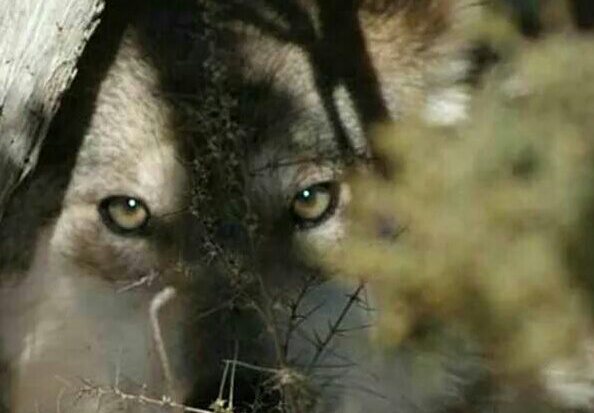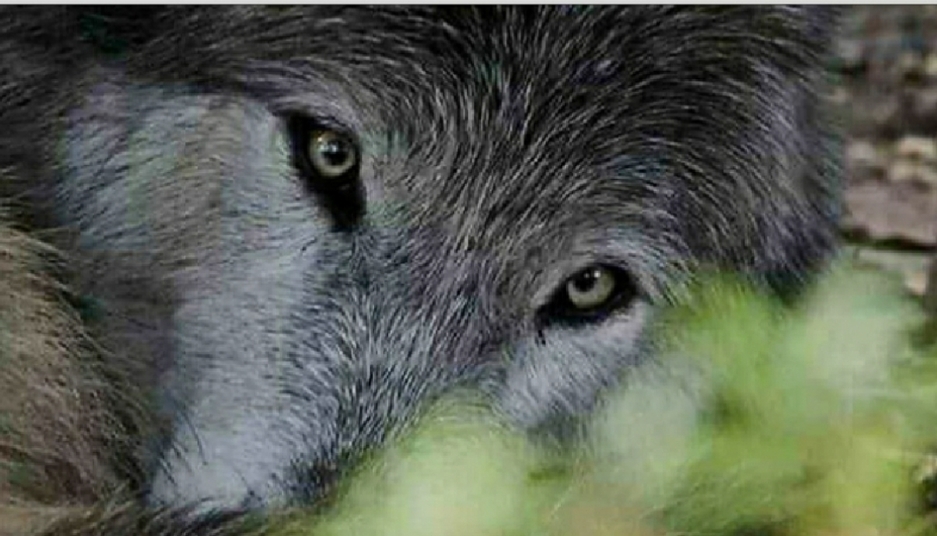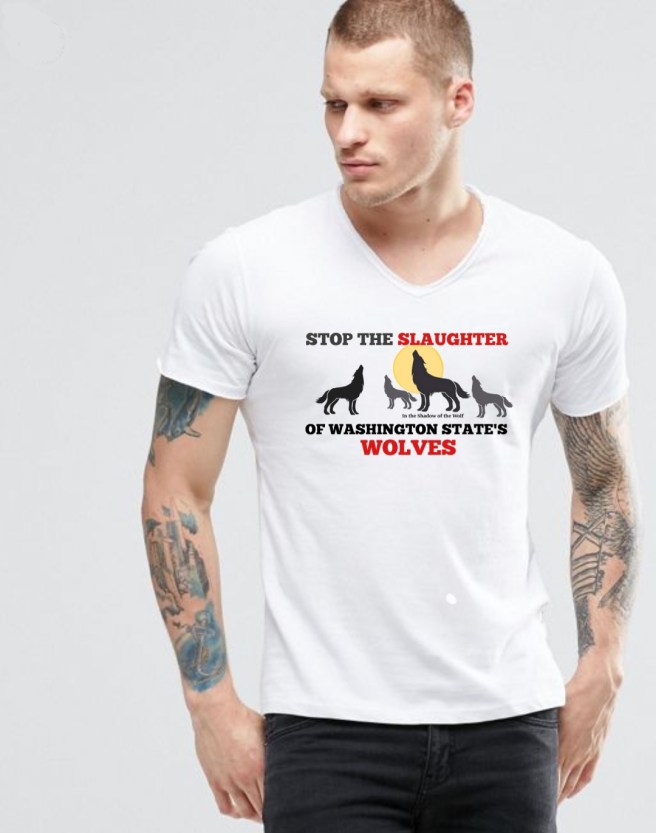Update August 19: New take urgent action post here.
The Old Profanity Territory (OPT) wolf pack was confirmed as a pack in 2018. According to the annual population survey completed on December 31, 2018, the pack had a minimum count of four wolves and was considered a successful breeding pair.
Recently, WDFW estimated the OPT pack to have 9 wolves in the pack, including four pups. However, in response to livestock depredations, WDFW lethally “removed” one of the 9 wolves, a radio-collared adult male, on July 13th of this year (which means this pack is no longer a “successful breeding pair”).
Because of additional depredations of cattle on federal grazing lands (aka your public lands in our nation’s forests) in the Kettle River range of Ferry County, the 8 remaining family members are now running for their lives—including the 4 pups, as the WDFW director reauthorized further “removals” on July 31st. We hoped that a temporary restraining order to prevent further OPT removal would gain approval in the courts, but was denied on August 2nd; the court hearing is scheduled for August 16th.).

The OPT pack is “credited” with 27 depredations since Sept. 5, 2018 according to the agency. Just three of these depredations are documented as outside the grazing season—the rest near known wolf denning sites—on taxpayer supported lands—our national forests.
Sound familiar?
The original Profanity Peak pack was nearly wiped out by Washington Department of Fish and Wildlife in 2016 in response to depredations on the same ranch, Diamond M.
One of the Profanity Peak pack wolves, shot by gunners from a helicopter, did not immediately die and had to be put out of its suffering when it was located three days later. The state intended to kill all members of the Profanity Peak pack, but despite an 11-week effort, 4 ended up surviving, one adult female that had been collared in 2016, attempting the impossible—caring for the three pups which also escaped aerial gunning. This adult female was illegally killed and found dead on Dec. 5, 2017. She was the last known member of the Profanity Peak pack — what became of the pups is unknown.
Washington wildlife managers spent $135,000 that year to kill seven of the 11 family members. Len and Bill McIrvin, of the Diamond M Ranch were also responsible for the slaughter of the Wedge pack in 2012, to the tune of $76,500.
History is about to repeat itself.
“WA State has killed 18 wolves [26 as of 8/16/2019] since 2012, all because Len McIrvin, owner of the richest cattle ranch in the State, thinks getting paid twice the value of a dead cow is a “crooked damn deal” and that, basically, the only good wolf is a dead wolf.”
The killing of the Profanity Pack was followed by kill orders for the Sherman Pack, the Smackout and Togo Packs, and more recently, kill orders against the wolves who filled the vacant territory on Profanity Peak, a pack now referred to as the Old Profanity Territory (OPT) Pack, but what we call the #ProfanityPeakPack2 (utilize this hashtag on social media). In fact, WDFW previously failed at an attempt to eliminate the entire OPT pack in November 2018, but did kill a juvenile member and a breeding female.
This is the fourth year in a row that the state has lethally removed wolves in this region, with two packs being eliminated entirely in the process.

“Stop wolves from killing cattle, that is the goal of lethal removal,” the state’s wolf policy director Donny Martorello has said. “And based on the pattern that we are seeing and the most recent depredations, we don’t believe we have achieved that goal yet and so the result is the lethal removal action by the department is ongoing.”
Certainly we will see the demise of another entire family of wolves if the Mcirvin’s get there way. And though half a million people signed a letter urging Governor Inslee to oppose wolf slaughter in Washington state, he has distanced himself from the situation.
Speak out on behalf of the OPT wolf family.
Please personalize and send this email to Governor Inslee (link for your email below sample letter):
The Honorable Jay Inslee
Office of the Governor
PO Box 40002
Olympia, WA 98504
RE: Wolf Management in Washington
Dear Governor Inslee:
Once again another wolf family will be shattered because of one particular livestock operator. I ask that you direct the state’s wildlife managers to rescind the kill order for members of the OPT wolf pack, and urge them to make progressive, science-based changes in wolf management, with an emphasis on changes that do not allow lethal removal of wolves on taxpayer supported public lands. In addition, I ask that you to urge the Forest Service to retire grazing permits near known wolf denning sites.
As governor, you have made science a hallmark of your administration and championed the state’s major environmental protection laws. However, the decisions made by the Washington Fish and Wildlife Department, with regards to wolves, fall hopelessly short of your administration’s environmental policies. By continually killing wolves, their actions allow for ongoing social intolerance of the animals, creating escalating conflict between not just wolves and livestock but between people with differing viewpoints. Washington has a long history of gunning down wolves within its borders in those parts of the state where the animals remain “protected” under state law. Since 2012 the state has killed 23 wolves with state endangered status, 19 of which were killed for the same livestock owner. The state shattered the Togo pack twice and began removals from the OPT pack late last year, after destroying the Wedge pack in 2012 and the Profanity Peak pack in 2016.
Many people—worldwide—will never forget the brutal slaying of the original Profanity Peak pack wolf family in 2016. Seven animals gunned down, including a pup by WDFW sharpshooters via helicopter after Len and Bill McIrvin of the Diamond M. Ranch demanded the entire pack be slaughtered. The McIrvin’s had refused to sign and/or abide by the WDFW Cooperative Damage Agreement for compensation. The bare minimum of proactive nonlethal conflict deterrence measures were utilized by the ranch, with a range rider attempting to monitor livestock on a vast amount of our public lands—most of which is very rugged terrain. When asked about protecting his livestock, Len McIrvin’s responded saying “the idea of protecting our cattle is ridiculous because they are out in the mountains, often in heavy timber.” Indeed, the terrain on Profanity Peak is so rugged and ill-suited for livestock that when the grazing season closed, it was several months before Diamond M Ranch could locate a portion of his cattle for a very untimely removal.
Clearly, the policies developed by the Wolf Advisory Group and WDFW foster an endless cycle of killing wolves, often in areas that are not only ideal habitat where wolves should be allowed to live in peace, but also areas unsuitable for livestock and the ability to protect that livestock. It is also important to remember that while livestock grazing is a legally permitted use of public lands, that use is contingent upon livestock production not harming public values. A new protocol must be examined to reduce conflict, one that does not include taking this sort of senseless lethal action, and one that does not violate the public’s patrimony.
As you know overwhelming evidence of the IPBES Global Assessment, from a wide range of different fields of knowledge recently presented an ominous picture—the health of ecosystems on which we and all other species depend is deteriorating more rapidly than ever before. We are eroding the very foundations of our economies, livelihoods, food security, health and quality of life worldwide. Now, more than ever we need to protect the health of our public lands, including our forests, wilderness areas, and wildlife refuges. In order to restore biodiversity, livestock production on, and utilization of our public lands, must not continue to be a priority.
Ranchers who run their livestock on public land impose a huge cost on the public not only in terms of direct subsidies provided by the federal government, but also via indirect subsidies such as the lethal wolf control on our forest lands in Washington state. More importantly, the degradation of ecosystems, the displacement of native wildlife, the destruction of large carnivores necessary for a balanced ecosystem (including those protected under the ESA), the toxic runoff in our rivers and streams, and the trampling of riparian areas, are unacceptable consequences of livestock production on taxpayer supported lands.
Welfare ranching—aka corporate socialism—turning a profit by feeding off the taxpayer also imposes a cost on the public’s wildlife: Ranchers regularly have predators killed to ensure the safety of their animals. Running livestock in the backcountry of the public domain should mean accepting that when you put defenseless domesticated animals out into the wild, they are occasionally going to get eaten. And you have to also accept that wolves have every right to eat them. It’s their land too. Ranchers getting subsidized forage on our public lands, reimbursement for losses due to depredation, as well as grazing livestock near known wolf habitat should gracefully accept their losses and/or terminate their lease.
Our public lands and ecosystems should not be sacrificed for the private profit of individuals. Study after study has demonstrated that grazing of livestock depresses virtually all species of wildlife, and on western rangelands has probably had a greater adverse impact on wildlife populations than any other single factor. We all have a responsibility to the Earth, our environment, and our wildlife, including wolves. It is far past time for the health of our planet and the survival of our co-inhabitants to be of the utmost importance; our focus should be on eliminating that which degrades our forests and other public lands and destroys our ecosystems.
Again, I ask that you direct the state’s wildlife managers to rescind the kill order for members of the OPT wolf pack, and urge them to make progressive, science-based changes in wolf management, with an emphasis on changes that do not allow lethal removal of wolves on taxpayer supported public lands. Please urge the Forest Service to retire grazing permits, and close allotments near known wolf denning sites.
Thank you for your time and consideration of this urgent matter,
Your name
Please send your email to Governor Inslee here: governor@gov.wa.gov
Please cc Jamal Raad (the Governor’s communications director): hello@jayinslee.com
Should your email bounce back, send your letter to Governor Inslee here. Follow up with a phone call: 360-902-4111
Please personalize and send this second email to Kelly Susewind and Donny Martorello (Wolf Policy Lead). Again the link for sending your email can be found at the end of our sample letter:
Kelly Susewind, Director
Donny Martorello, Wolf Policy Lead
Washington Department of Fish and Wildlife
Natural Resources Building
1111 Washington St. SE
Olympia, WA 98501
Dear Mr. Susewind, and Mr. Martorello:
Once again another wolf family will be shattered because of one particular livestock operator. I ask that you reconsider removing more members of the OPT wolf family.
Clearly, the policies developed by the Wolf Advisory Group and WDFW foster an endless cycle of killing wolves, often in areas that are not only ideal wolf habitat where the animals should be allowed to live in peace, but also areas unsuitable for livestock and the ability to protect that livestock.
Many people—worldwide—will never forget the brutal slaying of the original Profanity Peak pack wolf family in 2016. Seven animals gunned down, including a pup by WDFW sharpshooters via helicopter after Len and Bill McIrvin of the Diamond M. Ranch demanded the entire pack be slaughtered. The McIrvin’s had refused to sign and/or abide by the WDFW Cooperative Damage Agreement for compensation. The bare minimum of proactive nonlethal conflict deterrence measures were utilized by the ranch, with a range rider attempting to monitor livestock on a vast amount of our public lands—most of which is very rugged terrain. When asked about protecting his livestock, Len McIrvin’s responded saying “the idea of protecting our cattle is ridiculous because they are out in the mountains, often in heavy timber.” Indeed, the terrain on Profanity Peak is so rugged and ill-suited for livestock that when the grazing season closed, it was several months before Diamond M Ranch could locate a portion of his cattle for a very untimely removal.
Ranchers who run their livestock on public land impose a huge cost on the public not only in terms of direct subsidies provided by the federal government, but also via indirect subsidies such as the lethal wolf control on our forest lands in Washington state. More importantly, the degradation of ecosystems, the displacement of native wildlife, the destruction of large carnivores necessary for a balanced ecosystem (including those protected under the ESA), the toxic runoff in our rivers and streams, and the trampling of riparian areas, are unacceptable consequences of livestock production on taxpayer supported lands.
It is also important to remember that while livestock grazing is a legally permitted use of public lands, that use is contingent upon livestock production not harming public values.
A new protocol must be examined to reduce conflict, one that does not include taking this sort of senseless lethal action, and one that does not violate the public’s patrimony.
Progressive, science-based changes in wolf management, with an emphasis on changes that do not allow lethal removal of wolves on taxpayer supported public lands are sorely needed. In addition, I ask that you to urge the Forest Service to retire grazing permits near known wolf denning sites. Our public lands and ecosystems should not be sacrificed for the private profit of individuals.
Thank you for your time, I look forward to hearing from you.
Tap link below to paste, personalize, and send:
Kelly.Susewind@dfw.wa.gov,Donny.Martorello@dfw.wa.gov,wildthing@dfw.wa.gov
Please follow up with a phone call.
Director Susewind: 360-902-2200
Donny Martorello: 360-902-2515
Send a copy to the Colville National Forest Supervisor, Rodney Smoldon, here
Or by hard mail here:
Colville National Forest
Supervisor’s Office
765 South Main Street
Colville, WA 99114
Phone: (509) 684-7000
If you are on Twitter, a tweetsheet can be found here, with new tweets added as the situation progresses.
Important Notice:
The Washington Department of Fish and Wildlife is inviting the public to comment on the scope of a post-recovery plan for wolves in Washington (Plan). The State Environmental Policy Act, or SEPA, process will be used to develop the Plan. This involves preparing a draft Environmental Impact Statement, or EIS, that will be available for public review. That document will evaluate actions, alternatives, and impacts related to long-term wolf conservation and management.
Please take a few moments to complete a brief scoping questionnaire (users may also submit open comments and upload file attachments in the questionnaire). This is the preferred method for receiving your comments.
Alternatively, you may also only submit an open comment.
The deadline for submitting scoping comments is Nov. 1, 2019 at 5 p.m. PT. For additional information, and a list of public scoping open houses, follow this link.
Should you be organizing or attending a rally for Washington’s wolves, we would be delighted to offer our “Save WA Wolves” t-shirts at cost. Give us a shout for pricing and details here, please write WA wolves in the subject line.
Visit our Creative Arts and Work shop here for t-shirts, sweatshirts, wall art and a variety of home decor. Up 100% of our profits are donated to organizations working towards the protection of wolves and our environment.

Washington wolf advisory group membership roster
Feature image credit: Weimann/Getty images
Copyright © 2019 [COPYRIGHT Intheshadowofthewolf. Name and Webpage]. All Rights Reserved




You must be logged in to post a comment.